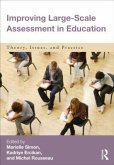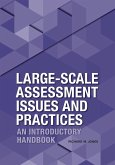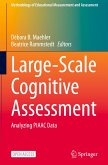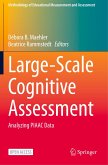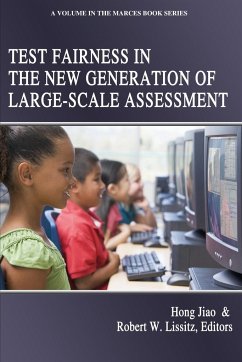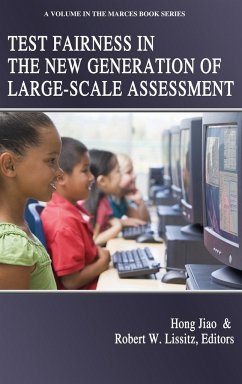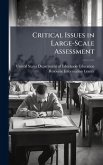Culturally Responsive Assessment in Classrooms and Large-Scale Contexts
Theory, Research, and Practice
Herausgeber: Evans, Carla M.; Taylor, Catherine S.
Culturally Responsive Assessment in Classrooms and Large-Scale Contexts
Theory, Research, and Practice
Herausgeber: Evans, Carla M.; Taylor, Catherine S.
- Gebundenes Buch
- Merkliste
- Auf die Merkliste
- Bewerten Bewerten
- Teilen
- Produkt teilen
- Produkterinnerung
- Produkterinnerung
Culturally Responsive Assessment in Classrooms and Large-Scale Contexts explores how scholars and professionals in educational measurement and assessment can use the unique cultural and social identities of students to shape assessment purpose, design, implementation, use, and validation processes.
Andere Kunden interessierten sich auch für
![Improving Large-Scale Assessment in Education Improving Large-Scale Assessment in Education]() Improving Large-Scale Assessment in Education103,99 €
Improving Large-Scale Assessment in Education103,99 €![Large-Scale Assessment Issues and Practices Large-Scale Assessment Issues and Practices]() Richard Merrick JonesLarge-Scale Assessment Issues and Practices51,99 €
Richard Merrick JonesLarge-Scale Assessment Issues and Practices51,99 €![Large-Scale Cognitive Assessment Large-Scale Cognitive Assessment]() Large-Scale Cognitive Assessment38,99 €
Large-Scale Cognitive Assessment38,99 €![Large-Scale Cognitive Assessment Large-Scale Cognitive Assessment]() Large-Scale Cognitive Assessment31,99 €
Large-Scale Cognitive Assessment31,99 €![Test Fairness in the New Generation of Large-Scale Assessment Test Fairness in the New Generation of Large-Scale Assessment]() Test Fairness in the New Generation of Large-Scale Assessment56,99 €
Test Fairness in the New Generation of Large-Scale Assessment56,99 €![Test Fairness in the New Generation of Large-Scale Assessment (hc) Test Fairness in the New Generation of Large-Scale Assessment (hc)]() Test Fairness in the New Generation of Large-Scale Assessment (hc)99,99 €
Test Fairness in the New Generation of Large-Scale Assessment (hc)99,99 €![Critical Issues in Large-Scale Assessment Critical Issues in Large-Scale Assessment]() Critical Issues in Large-Scale Assessment28,99 €
Critical Issues in Large-Scale Assessment28,99 €-
-
-
Culturally Responsive Assessment in Classrooms and Large-Scale Contexts explores how scholars and professionals in educational measurement and assessment can use the unique cultural and social identities of students to shape assessment purpose, design, implementation, use, and validation processes.
Produktdetails
- Produktdetails
- Verlag: Routledge
- Seitenzahl: 410
- Erscheinungstermin: 10. März 2025
- Englisch
- Abmessung: 260mm x 183mm x 27mm
- Gewicht: 963g
- ISBN-13: 9781032504902
- ISBN-10: 1032504900
- Artikelnr.: 72110633
- Herstellerkennzeichnung
- Libri GmbH
- Europaallee 1
- 36244 Bad Hersfeld
- gpsr@libri.de
- Verlag: Routledge
- Seitenzahl: 410
- Erscheinungstermin: 10. März 2025
- Englisch
- Abmessung: 260mm x 183mm x 27mm
- Gewicht: 963g
- ISBN-13: 9781032504902
- ISBN-10: 1032504900
- Artikelnr.: 72110633
- Herstellerkennzeichnung
- Libri GmbH
- Europaallee 1
- 36244 Bad Hersfeld
- gpsr@libri.de
Carla M. Evans is Senior Associate at The National Center for the Improvement of Educational Assessment and Adjunct Professor of Education at the University of New Hampshire, USA. Catherine S. Taylor is Professor Emerita at the University of Washington, USA, and was Senior Vice President for Measurement Services at Measured Progress.
Introduction 1. Re-imagining the Future of Assessment that Honors Human
Diversity Section 1: Culturally Responsive Assessment: Theoretical
Foundations and Concepts 2. Building from Sociocultural Learning Theory to
Culturally Responsive Assessment 3. Student Engagement, Motivation, and
Assessment: A Critical Triad Requiring Critical Reform 4. Voice,
Recognition, and Exit: A Rights-Based Response to Cultural Bias in
Educational Assessments 5. Using a QuantCrit Lens to Analyze Data from a
Culturally Responsive Assessment 6. A Framework for Enacting Equity Aims in
Assessment Use: A Justice-Oriented Approach 7. Validity Argumentation for
Culturally Responsive Assessments 8. Building the Conceptual Foundations of
Culturally Responsive Assessment: An Analysis of a Sample of Conceptual
Pieces Across Multiple Assessment Process Components-Commentary on Section
1 Section 2: Implications of Culturally Responsive Assessment for
Large-Scale Assessment Practices 9. A Measurement Argument for Culturally
Responsive Assessment 10. Reconsidering Theories of Action: Using Cultural
and Community Validity to Transform Assessment Development, Implementation,
and Use 11. Working Toward Culturally Sustaining Workplace Assessment
Programs Using an Integrated Design and Appraisal Framework 12. Anti-Racist
Approaches to Scoring Large-Scale Assessments 13. On Objectivity,
Multicultural Education, and Large-Scale Assessments-Commentary on Section
2 14. An Evidentiary-Reasoning Perspective on Culturally Responsive
Assessment-Commentary on Section 2 Section 3: Implications of Culturally
Responsive Assessment for Classroom Assessment Practices 15. Implications
of Culturally Responsive Education for Classroom Assessment Practices 16.
Manifesting the Mana of Culturally Responsive Assessments 17. How
Culturally Responsive Formative Assessment Practices Can Expand Students'
Opportunities to Participate in Science Learning 18. Equitable and
Culturally Relevant Grading Practices 19. Teachers' Mis-Assessment of Black
Children's Behavior: What's Culture Got to Do With it? 20. Reflections on
Some Current Approaches to Culturally Responsive Assessment-Commentary on
Section 3 21. From "But that's just good teaching" to "An ethical
imperative": The Role of Culturally Responsive Practices in Classroom
Assessment-Commentary on Section 3 22. Culturally Responsive Assessment:
Lessons Learned So Far by Catherine S. Taylor & Carla M. Evans
Diversity Section 1: Culturally Responsive Assessment: Theoretical
Foundations and Concepts 2. Building from Sociocultural Learning Theory to
Culturally Responsive Assessment 3. Student Engagement, Motivation, and
Assessment: A Critical Triad Requiring Critical Reform 4. Voice,
Recognition, and Exit: A Rights-Based Response to Cultural Bias in
Educational Assessments 5. Using a QuantCrit Lens to Analyze Data from a
Culturally Responsive Assessment 6. A Framework for Enacting Equity Aims in
Assessment Use: A Justice-Oriented Approach 7. Validity Argumentation for
Culturally Responsive Assessments 8. Building the Conceptual Foundations of
Culturally Responsive Assessment: An Analysis of a Sample of Conceptual
Pieces Across Multiple Assessment Process Components-Commentary on Section
1 Section 2: Implications of Culturally Responsive Assessment for
Large-Scale Assessment Practices 9. A Measurement Argument for Culturally
Responsive Assessment 10. Reconsidering Theories of Action: Using Cultural
and Community Validity to Transform Assessment Development, Implementation,
and Use 11. Working Toward Culturally Sustaining Workplace Assessment
Programs Using an Integrated Design and Appraisal Framework 12. Anti-Racist
Approaches to Scoring Large-Scale Assessments 13. On Objectivity,
Multicultural Education, and Large-Scale Assessments-Commentary on Section
2 14. An Evidentiary-Reasoning Perspective on Culturally Responsive
Assessment-Commentary on Section 2 Section 3: Implications of Culturally
Responsive Assessment for Classroom Assessment Practices 15. Implications
of Culturally Responsive Education for Classroom Assessment Practices 16.
Manifesting the Mana of Culturally Responsive Assessments 17. How
Culturally Responsive Formative Assessment Practices Can Expand Students'
Opportunities to Participate in Science Learning 18. Equitable and
Culturally Relevant Grading Practices 19. Teachers' Mis-Assessment of Black
Children's Behavior: What's Culture Got to Do With it? 20. Reflections on
Some Current Approaches to Culturally Responsive Assessment-Commentary on
Section 3 21. From "But that's just good teaching" to "An ethical
imperative": The Role of Culturally Responsive Practices in Classroom
Assessment-Commentary on Section 3 22. Culturally Responsive Assessment:
Lessons Learned So Far by Catherine S. Taylor & Carla M. Evans
Introduction 1. Re-imagining the Future of Assessment that Honors Human
Diversity Section 1: Culturally Responsive Assessment: Theoretical
Foundations and Concepts 2. Building from Sociocultural Learning Theory to
Culturally Responsive Assessment 3. Student Engagement, Motivation, and
Assessment: A Critical Triad Requiring Critical Reform 4. Voice,
Recognition, and Exit: A Rights-Based Response to Cultural Bias in
Educational Assessments 5. Using a QuantCrit Lens to Analyze Data from a
Culturally Responsive Assessment 6. A Framework for Enacting Equity Aims in
Assessment Use: A Justice-Oriented Approach 7. Validity Argumentation for
Culturally Responsive Assessments 8. Building the Conceptual Foundations of
Culturally Responsive Assessment: An Analysis of a Sample of Conceptual
Pieces Across Multiple Assessment Process Components-Commentary on Section
1 Section 2: Implications of Culturally Responsive Assessment for
Large-Scale Assessment Practices 9. A Measurement Argument for Culturally
Responsive Assessment 10. Reconsidering Theories of Action: Using Cultural
and Community Validity to Transform Assessment Development, Implementation,
and Use 11. Working Toward Culturally Sustaining Workplace Assessment
Programs Using an Integrated Design and Appraisal Framework 12. Anti-Racist
Approaches to Scoring Large-Scale Assessments 13. On Objectivity,
Multicultural Education, and Large-Scale Assessments-Commentary on Section
2 14. An Evidentiary-Reasoning Perspective on Culturally Responsive
Assessment-Commentary on Section 2 Section 3: Implications of Culturally
Responsive Assessment for Classroom Assessment Practices 15. Implications
of Culturally Responsive Education for Classroom Assessment Practices 16.
Manifesting the Mana of Culturally Responsive Assessments 17. How
Culturally Responsive Formative Assessment Practices Can Expand Students'
Opportunities to Participate in Science Learning 18. Equitable and
Culturally Relevant Grading Practices 19. Teachers' Mis-Assessment of Black
Children's Behavior: What's Culture Got to Do With it? 20. Reflections on
Some Current Approaches to Culturally Responsive Assessment-Commentary on
Section 3 21. From "But that's just good teaching" to "An ethical
imperative": The Role of Culturally Responsive Practices in Classroom
Assessment-Commentary on Section 3 22. Culturally Responsive Assessment:
Lessons Learned So Far by Catherine S. Taylor & Carla M. Evans
Diversity Section 1: Culturally Responsive Assessment: Theoretical
Foundations and Concepts 2. Building from Sociocultural Learning Theory to
Culturally Responsive Assessment 3. Student Engagement, Motivation, and
Assessment: A Critical Triad Requiring Critical Reform 4. Voice,
Recognition, and Exit: A Rights-Based Response to Cultural Bias in
Educational Assessments 5. Using a QuantCrit Lens to Analyze Data from a
Culturally Responsive Assessment 6. A Framework for Enacting Equity Aims in
Assessment Use: A Justice-Oriented Approach 7. Validity Argumentation for
Culturally Responsive Assessments 8. Building the Conceptual Foundations of
Culturally Responsive Assessment: An Analysis of a Sample of Conceptual
Pieces Across Multiple Assessment Process Components-Commentary on Section
1 Section 2: Implications of Culturally Responsive Assessment for
Large-Scale Assessment Practices 9. A Measurement Argument for Culturally
Responsive Assessment 10. Reconsidering Theories of Action: Using Cultural
and Community Validity to Transform Assessment Development, Implementation,
and Use 11. Working Toward Culturally Sustaining Workplace Assessment
Programs Using an Integrated Design and Appraisal Framework 12. Anti-Racist
Approaches to Scoring Large-Scale Assessments 13. On Objectivity,
Multicultural Education, and Large-Scale Assessments-Commentary on Section
2 14. An Evidentiary-Reasoning Perspective on Culturally Responsive
Assessment-Commentary on Section 2 Section 3: Implications of Culturally
Responsive Assessment for Classroom Assessment Practices 15. Implications
of Culturally Responsive Education for Classroom Assessment Practices 16.
Manifesting the Mana of Culturally Responsive Assessments 17. How
Culturally Responsive Formative Assessment Practices Can Expand Students'
Opportunities to Participate in Science Learning 18. Equitable and
Culturally Relevant Grading Practices 19. Teachers' Mis-Assessment of Black
Children's Behavior: What's Culture Got to Do With it? 20. Reflections on
Some Current Approaches to Culturally Responsive Assessment-Commentary on
Section 3 21. From "But that's just good teaching" to "An ethical
imperative": The Role of Culturally Responsive Practices in Classroom
Assessment-Commentary on Section 3 22. Culturally Responsive Assessment:
Lessons Learned So Far by Catherine S. Taylor & Carla M. Evans


